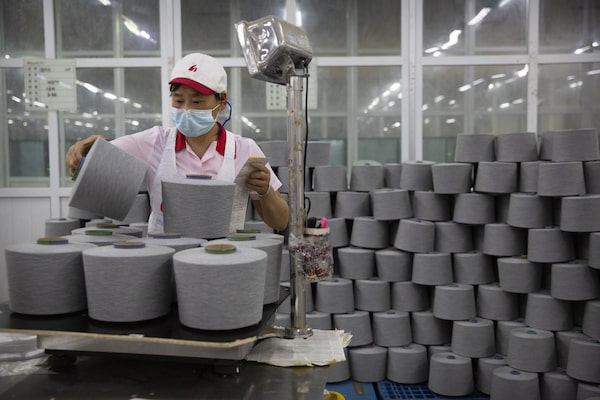
Team Canada x lululemon Athlete Kit Reveal in Toronto on Oct. 26.Vaughn Ridley/Getty Images
Lululemon, the apparel company selected as the official outfitter for Team Canada at the 2022 Beijing Winter Olympics, is among dozens of international brands and retailers at risk of having cotton produced by Chinese forced labour in their supply chains.
China’s northwestern Xinjiang region, which produces a fifth of the world’s cotton, is where researchers and critics say the Chinese government has committed grave human-rights violations against the largely Muslim population of Uyghurs and other minorities. Forced labour, they say, is the latest stage in Beijing’s efforts to exert control in an area with a large population of Muslim people that Beijing has described as infected by extremism.
A new report this week by the United Kingdom’s Sheffield Hallam University analyzed supply chain connections identified through shipping records to show how cotton from the Uyghur region circumvents supply standards and import bans to end up on clothing racks around the world. The researchers investigated the supply chains of brands such as Target, Walmart and Uniqlo, and Canadian retailers Aritzia and Lululemon, and found that many well-known brands are in danger of having cotton from the Xinjiang region in their finished products.
Xinjiang cotton ranks high on the list of materials companies are urged to avoid in the interests of keeping their goods free of coerced labour. The United States and Canada have made efforts to stop imports of such products, although identifying shipments is difficult.
The findings by Laura Murphy, a professor at Sheffield Hallam’s Helena Kennedy Centre for International Justice, indicate how pervasive cotton from Xinjiang is throughout global supply chains and how China benefits from an export strategy that obscures cotton’s origin.
Much of Xinjiang’s cotton output is routed through intermediary manufacturers in developing countries, which use the fabric and yarn from five leading Chinese manufacturers that have relied on Xinjiang cotton. In the report, Laundering Cotton: How Xinjiang Cotton is Obscured in International Supply Chains, Prof. Murphy and co-authors identify more than 50 contract garment suppliers – in Indonesia, Sri Lanka, Bangladesh, Vietnam, India, Pakistan, Kenya, Ethiopia, China and Mexico – that use the Xinjiang fabric and yarn in the clothes they make for leading brands, “thus obscuring the provenance of the cotton.”
“We identified 103 international retailers that were downstream of Xinjiang cotton,” Prof. Murphy told media on a conference call Friday. “Now this does not mean their products are necessarily made of Xinjiang cotton, because there is a lot of different connections in the supply chain, but they are at high risk of using Xinjiang cotton.”

A worker packages spools of cotton yarn at a Huafu Fashion plant, as seen during a government organized trip for foreign journalists, in Aksu in western China's Xinjiang Uyghur Autonomous Region, on April 20.Mark Schiefelbein/The Associated Press
In one example, researchers identified Lululemon, which has its headquarters in Vancouver, as a customer of an intermediary manufacturer called MAS Active that gets materials from Huafu Fashion Co. Ltd., which has a million acres of cotton farmland in Xinjiang and many factories in the region.
Prof. Murphy said she and researchers did not receive a response when they contacted Lululemon about their findings.
Two representatives of Lululemon did not respond to e-mail and phone requests from The Globe and Mail to comment for this story, including questions about what the company is doing to ensure materials linked to forced labour do not get to store shelves.
The report noted that Vancouver-based Aritzia buys from an intermediary called Brandix Apparel, which also sources from other intermediaries identified as using cotton from Xinjiang. In an e-mailed statement, Aritzia spokesperson Lauren Pavan wrote the company has a supplier code of conduct – which states suppliers should provide safe workplaces and “reasonable and appropriate” hours and wages – and commits to comply with trade regulations. “We have an ongoing dialogue with our supply chain to continuously enhance traceability and, in doing so, safeguard and uphold human rights,” she wrote.
The report points out that Canadian customs rules require companies to sign an integrity declaration on doing business with Xinjiang entities – but that companies must only confirm they are abiding by the rules “to their knowledge”. The authors suggest this may be an incentive for companies not to investigate. The report recommends legislation holding companies liable for benefitting from forced labour. And because government interference in China complicates due diligence on these issues, the report urges companies to “disengage from any supplier (and its parent and subsidiaries) located in or sourcing from the Uyghur Region”.
Industry group the Retail Council of Canada believes any policy should draw a distinction “between willful blindness and that which is not,” spokesperson Michelle Wasylyshen wrote in an e-mail. Ms. Wasylyshen did not answer questions about the council’s view on whether retailers should cut off suppliers who do business in Xinjiang, but said in a statement that “Canadian retailers are committed to operating and sourcing responsibly and don’t condone forced labour under any circumstances.”
To map the supply chains from raw materials to finished consumer goods, the researchers identified leading Chinese manufacturers of yarn and fabric that have Uyghur region operations or suppliers and traced their semi-finished exports to intermediaries in developing countries. Then they identified the international companies to which those intermediaries shipped cotton and mixed-cotton products.
“The benefits of such an export strategy may be clear: the end buyer is no longer directly involved in buying Xinjiang cotton,” the report said. “International brands and wholesalers can buy from factories in third countries that have few visible ties with Uyghur region-based companies,” it continued. “A stable supply of Xinjiang cotton to the international market is thus guaranteed, even as brands, governments, and consumers increasingly turn away from Xinjiang forced-labor-made goods.”
Our Morning Update and Evening Update newsletters are written by Globe editors, giving you a concise summary of the day’s most important headlines. Sign up today.
 Steven Chase
Steven Chase Susan Krashinsky Robertson
Susan Krashinsky Robertson